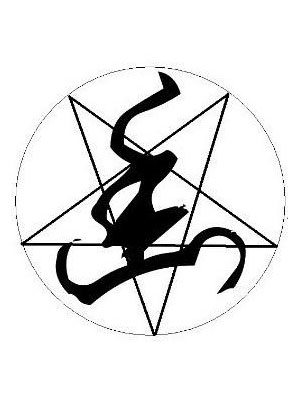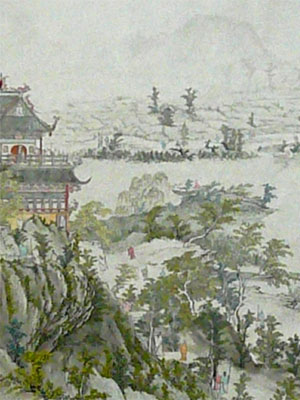 Inner Society covers metal of the past and present both in China and the world. Strider, the editor and progenitor of this project, took a few moments to speak with us about his role in music and the strength of metal that powers the blog.
Inner Society covers metal of the past and present both in China and the world. Strider, the editor and progenitor of this project, took a few moments to speak with us about his role in music and the strength of metal that powers the blog.
How did you become a fan of heavy metal music, and what made you decide to take the next step to being active in the community?
A net friend introduced me to Emperor, Dimmu Borgir, Burzum and other extreme metal bands during my first semester in college when I was just a mainstream alternative heavy music (like NIN and Tool) listener at the time. From then on I became a diehard metal fan.
I spent a lot of time surfing metal forums at the beginning of this process, debating about music and searching for anything I found interesting about metal. After listening to metal for about five years, and gaining skill at playing an instrument at the same time, I digested most of the big names in metal and became selective about what I heard. All those pop-song formulated and chord-based music are of little interest to me in the guidance of DLA and DMU.
At this point, I felt an urge to construct a community for all the people who like me have had enough of the dramatic modern music scene and instead want to study the heroic, narrative, anti-modernism nature of metal. Thus I created the blog.
China has been steadily increasing its numbers of metal bands. Do you think a distinct national sound is emerging? Or are there multiple national sounds (regional, like in the USA, or ethnic, like in Europe) appearing? Can you describe it, and mention how it pairs up with any belief systems that may have guided it?
Yes, bands like Zuriaake and its follower Deep Mountains had pioneered a sound that combines the Romantic side, more specifically the spirit in the Tang Dynasty poems and the landscape paintings of ancient China, with black metal.
Their usage of drumbeats are in the vein of court dances while the guitar sound resembles the overwhelming feelings of the misty Chinese mountain scenes. Together they provide a unique national metal sound that is very distinct from the average black metal bands.
But the problem is that these bands are at their core depressive or suicidal metal acts, which tosses decomposing chords and weepy riffs like an emo/screamo band would use into the songwriting mold of Burzum while lacking a valid direction. Basically they have nothing to say: they are aesthetically innovative but not transcendental.
Your blog, Inner Society, features an academic but practical look at the history of metal and its classic works. What are the advantages of this approach, in your view, relative to them more fan-based view that most sites take?
The fan-based metal sites are nightmares to me. They group all the people including the self-image-showcase hipsters into the same place in the name of metal. This lets everyone scream out their opinions no matter how foolish or worthless they are. Eventually this drowns the quality works in the sea of generic. That’s why I found DLA and DMU appealing at first place and ultimately created the counterpart in Chinese.
 Do you think metal music is in a slump? If so, how would it get out of this slump? What is it that makes the older metal stand out more, in the West at least, than the newer metal? Is there an idea, spirit or approach that works best?
Do you think metal music is in a slump? If so, how would it get out of this slump? What is it that makes the older metal stand out more, in the West at least, than the newer metal? Is there an idea, spirit or approach that works best?
Yes, metal music is dead at least on the surface of this planet. If it is to rise again the fans and the artists should learn to appreciate the consistency, integrity and artistic (as in classical music) approach that the older works endorse. Don’t lower standards if the music is not on par with the classic Burzum or Pestilence albums, because if we lower standards, metal will not be reborn; instead, we will get a wreck of clones and mainstream-absorbed rock star wannabes, and their popularity will drown out any quality metal that does birth itself.
What is it that makes the older metal stand out more, in the West at least, than the newer metal? Is there an idea, spirit or approach that works best?
There is an old saying in China: The times produce their heroes.
I think the same applies to the older metal bands. They had a broader space for development during the birth of underground metal. Based on the melody line oriented composition mode (the usage of movable power chords) and the barbaric image (anti-modernism) of the past metal genres, bands like Slayer, Sepultura, Possessed and Bathory simply took everything further. Ultimately, they pushed metal to a more extreme and more intricate height.
Whereas the newer bands are confronted with a highly commercialized metal scene, in which most of the people are looking for the metal version of rock music.Deep in their hearts, they know writing something as cryptic as the old classics would immediately cause them unpopular(at least it is so from the beginning). It feels like sail against the current.
In your view, is there something “ancient” about metal music that makes it so distinctive from every other pop genre? How would you characterize what you love about metal?
To me, the warlike guitar sound, orientation of melody lines and poetic structure of metal music are all inclined toward the ancient. Whereas other pop genres seems to be mostly about the celebration of modern world and modern lifestyles.
What I love about metal is that I think people can find the true beauty of our world through the abstract but reality-reflecting fantasy world that metal music creates in the absence of social pressure and the false values of our recent society. Metal culture is one of the few grounds nowadays that the hidden-reality-aware people can make use of to rebuild society from within, and that is definitely worth fighting for.
Visit Inner Society at www.innersociety.org.

